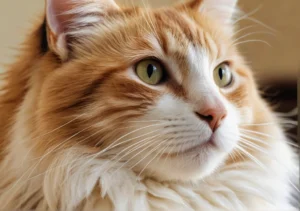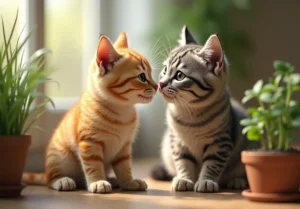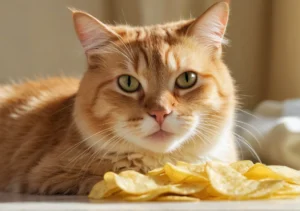Have you ever caught your furry feline friend munching on dirt in your backyard or houseplants? It may seem strange at first, but there are actually reasons behind this behavior. Let’s explore why cats eat dirt and what you can do about it.
Cats eating dirt may seem like a peculiar habit, but it can be attributed to various reasons such as a nutritional deficiency, boredom, or simply because they enjoy the taste and texture. Let’s dive into the world of cats and their unique eating habits.
Nutritional Deficiency
Is your curious feline developing a taste for dirt? It might be a sign that they are lacking some vital nutrients in their diet. Mineral deficiencies, such as iron or calcium, could be driving your cat to seek out alternative sources like soil to fulfill their needs.
To address this, consider consulting with your veterinarian to ensure your cat’s diet is well-balanced and meets all their nutritional requirements. High-quality cat food containing essential minerals and vitamins can help prevent deficiencies that may lead to dirt-eating behavior. Additionally, supplements recommended by your vet can be a valuable addition to your cat’s diet to fill any nutritional gaps.
Remember, a well-nourished cat is a happy cat, less likely to resort to munching on dirt for missing nutrients.
Boredom and Stress
Picture this: your cat leisurely exploring the backyard, only to resort to nibbling on dirt out of sheer boredom. Boredom and stress can trigger unusual behaviors in cats, including dirt-eating. To keep your feline friend entertained and content, enrich their environment with toys, scratching posts, and interactive play sessions to stimulate their minds and bodies.
Another tip is to create safe outdoor spaces where your cat can explore and engage in natural behaviors without the temptation of ingesting dirt. Cat grass or herb gardens can provide a safe outlet for their grazing instincts while keeping them away from potentially harmful substances in the soil.
By addressing boredom and stress, you can help prevent your cat from turning to dirt as a coping mechanism, keeping them happy and healthy.
Pica Behavior in Cats
Cats eating dirt might seem peculiar, but it could be a sign of pica behavior. This condition leads cats to consume non-food items, such as dirt, due to various reasons like nutritional deficiencies, boredom, or even exploration. To manage this behavior, it’s essential to consult a veterinarian to rule out any underlying health issues and to formulate a plan to address the root cause. Engaging your cat with interactive toys, providing a stimulating environment, and ensuring a balanced diet can all help deter them from eating dirt.
Safe Alternatives and Deterrents
When it comes to preventing your feline friend from snacking on dirt, there are safe alternatives and deterrents to consider. Opt for edible grasses like wheatgrass or catnip to satisfy their chewing instincts in a healthier way. Additionally, you can sprinkle citrus peels or use pet-safe deterrent sprays on the areas where your cat tends to indulge in dirt-eating. These methods can help redirect their behavior while keeping them safe and content. Remember, consistency is key in training your cat to avoid consuming dirt.
Safe Alternatives and Deterrents 1. Offer edible grasses like wheatgrass as a healthy alternative for your cat’s chewing needs. 2. Utilize citrus peels or pet-safe deterrent sprays to discourage dirt consumption. 3. Maintain a consistent approach to training your cat away from eating dirt.
By addressing the root cause of pica behavior and implementing safe alternatives and deterrents, you can help your cat lead a healthier and happier life while keeping their dirt-eating tendencies in check.
Environmental Enrichment
Cats are natural hunters and explorers, so it’s essential to provide them with plenty of environmental enrichment to keep them mentally stimulated and engaged. Interactive toys such as puzzle feeders or laser pointers can help satisfy their hunting instincts and prevent boredom, reducing the likelihood of them seeking out alternative activities like eating dirt. Cat trees or shelves near windows can also provide opportunities for climbing and observing their surroundings, simulating the outdoor environment they naturally crave.
Additionally, rotating toys and providing new and interesting scents through cat-safe plants or herbs can keep your feline friend entertained and less likely to turn to dirt for entertainment. Creating a cat-friendly outdoor space with grass or cat-safe plants can also give them a safe outlet for their natural behaviors.
Remember, a happy and mentally stimulated cat is less likely to engage in odd behaviors like eating dirt out of boredom. So, enriching their environment is key to promoting their overall well-being and preventing unwanted behaviors.
Potential Health Risks
While it may seem harmless, cats eating dirt can pose potential health risks that should not be overlooked. Ingesting dirt can lead to digestive issues such as vomiting, diarrhea, or constipation due to the foreign substances and bacteria present in the soil. Furthermore, some types of dirt may contain toxic chemicals, fertilizers, or pesticides that could be harmful if ingested.
In addition, parasites and microorganisms found in dirt can also be a concern, potentially leading to parasitic infections or other health issues. If you suspect your cat has been eating dirt or displaying any unusual symptoms, it’s crucial to consult your veterinarian for a proper evaluation and guidance.
To prevent your cat from eating dirt, ensure they have a balanced diet, plenty of fresh water, and a clean litter box to deter them from seeking out alternative substances. Regular veterinary check-ups and parasite prevention can also help keep your feline friend safe and healthy.
Remember, a proactive approach to your cat’s well-being can help prevent potential health risks associated with eating dirt, promoting a happy and healthy life for your beloved pet.
Consultation with a Veterinarian
If you notice your cat eating dirt, it’s essential to monitor their behavior closely. Dirt-eating can sometimes indicate underlying health issues like nutrient deficiencies or gastrointestinal problems. Should you observe your feline friend consuming dirt frequently, consult with a veterinarian promptly. They can perform tests to determine the root cause and recommend the appropriate course of action. Remember, your cat’s well-being is a top priority, so don’t hesitate to seek professional guidance when needed.
Fun Facts About Cats and Dirt
Cats’ relationship with dirt goes beyond mere appetite. Did you know that cats often ingest dirt as a way to aid digestion or eliminate hairballs? In their natural habitat, cats may also consume dirt to supplement trace minerals missing from their diet. This fascinating behavior showcases the resourcefulness of our feline companions. Additionally, cats’ sense of smell is highly developed, allowing them to detect minerals and other nutrients present in soil. Embrace these quirks as part of what makes cats so unique and endearing.
Fun Fact: Cats’ paw pads contain scent glands that leave their signature on surfaces as they scratch or dig in the dirt. This helps them mark territory and communicate with other felines in the area.
Alex, a passionate animal lover, has experience in training and understanding animal behavior. As a proud pet parent to two dogs and three cats, he founded AnimalReport.net to share insights from animal experts and expand his knowledge of the animal kingdom.




